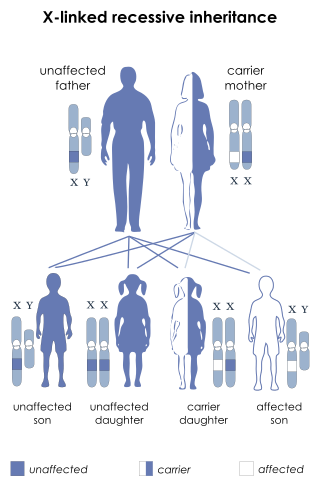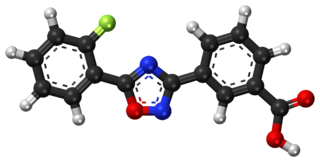Related Research Articles

Muscular dystrophies (MD) are a genetically and clinically heterogeneous group of rare neuromuscular diseases that cause progressive weakness and breakdown of skeletal muscles over time. The disorders differ as to which muscles are primarily affected, the degree of weakness, how fast they worsen, and when symptoms begin. Some types are also associated with problems in other organs.

The National Institutes of Health, commonly referred to as NIH, is the primary agency of the United States government responsible for biomedical and public health research. It was founded in the late 1880s and is now part of the United States Department of Health and Human Services. Many NIH facilities are located in Bethesda, Maryland, and other nearby suburbs of the Washington metropolitan area, with other primary facilities in the Research Triangle Park in North Carolina and smaller satellite facilities located around the United States. The NIH conducts its own scientific research through the NIH Intramural Research Program (IRP) and provides major biomedical research funding to non-NIH research facilities through its Extramural Research Program.
Muscular Dystrophy Association (MDA) is an American nonprofit organization dedicated to supporting people living with muscular dystrophy, ALS, and related neuromuscular diseases. Founded in 1950 by Paul Cohen, who lived with muscular dystrophy, MDA accelerates research, advances care, and works to empower families to live longer and more independent lives. Renowned for The MDA Labor Day Telethon, the annual telecast aired live from 1966 to 2010 and was hosted by Jerry Lewis, who also served as MDA's national chairman.
UMass Chan Medical School is a public medical school in Worcester, Massachusetts. It is part of the University of Massachusetts system. It is home to three schools: the T.H. Chan School of Medicine, the Morningside Graduate School of Biomedical Sciences, and the Tan Chingfen Graduate School of Nursing, as well as a biomedical research enterprise and a range of public-service initiatives throughout the state.

Becker muscular dystrophy is an X-linked recessive inherited disorder characterized by slowly progressing muscle weakness of the legs and pelvis. It is a type of dystrophinopathy. This is caused by mutations in the dystrophin gene, which encodes the protein dystrophin. Becker muscular dystrophy is related to Duchenne muscular dystrophy in that both result from a mutation in the dystrophin gene, but has a milder course.

Memorial Sloan Kettering Cancer Center is a cancer treatment and research institution in Manhattan in New York City. It was founded in 1884 as the New York Cancer Hospital. MSKCC is one of 52 National Cancer Institute–designated Comprehensive Cancer Centers. Its main campus is located at 1275 York Avenue between 67th and 68th Streets in Manhattan.

Medical research, also known as experimental medicine, encompasses a wide array of research, extending from "basic research", – involving fundamental scientific principles that may apply to a preclinical understanding – to clinical research, which involves studies of people who may be subjects in clinical trials. Within this spectrum is applied research, or translational research, conducted to expand knowledge in the field of medicine.

The Jackson Laboratory is an independent, non-profit biomedical research institution which was founded by Clarence Cook Little in 1929. It employs over 3,000 employees in Bar Harbor, Maine; Sacramento, California; Farmington, Connecticut; Shanghai, China; and Yokohama, Japan. The institution is a National Cancer Institute-designated Cancer Center and has NIH Centers of Excellence in aging and systems genetics. The stated mission of The Jackson Laboratory is "to discover the genetic basis for preventing, treating and curing human diseases, and to enable research and education for the global biomedical community."
Sheridan Gray Snyder OBE is an entrepreneur, venture capitalist, and philanthropist in the biotechnology industry. He is the founder and CEO of Biocatalyst, but also a "serial entrepreneur", a founder of Genzyme and many other companies. Snyder, who was the University of Virginia's best tennis player when he was studying for his BA in French and Romance Languages there in the 1960s, made "major contributions to the popularisation of tennis in the USA." He co-founded the National Junior Tennis League that reaches 250,000 inner-city young people and constructed a new tennis center at the University of Virginia.
Charles Thomas Caskey, also known as C. Thomas Caskey, was an American internist who has been a medical Geneticist and biomedical researcher and entrepreneur. He was a Professor of Molecular and Human Genetics at Baylor College of Medicine, and served as editor of the Annual Review of Medicine from 2001 to 2019. He was a member of the editorial boards of the Proceedings of the National Academy of Sciences, Science, the Encyclopedia of Molecular Medicine and numerous other medical and scientific journals.
James Sherley is a biological engineer and the founder of Asymmetrex, an adult stem cell research center. He has also conducted research at the Boston Biomedical Research Institute and Massachusetts Institute of Technology (MIT). Sherley filed a suit against the government in Sherley v. Sebelius, resulting in a protracted legal battle attempting to ban the government from funding any research relating to embryonic stem cells.

The ALS Therapy Development Institute is a non-profit biotechnology research organization focused on finding treatments for amyotrophic lateral sclerosis (ALS). With a staff including more than 30 scientists, it operates a research and development program centered on ALS.
The Muscular Dystrophy Community Assistance Research and Education Amendments of 2001 amended the Public Health Service Act to provide for research with respect to various forms of muscular dystrophy, including Duchenne, Becker, limb girdle, congenital, facioscapulohumeral, myotonic, oculopharyngeal, distal, and Emery–Dreifuss muscular dystrophies.

Ataluren, sold under the brand name Translarna, is a medication for the treatment of Duchenne muscular dystrophy. It was designed by PTC Therapeutics.

The Paul D. Wellstone Muscular Dystrophy Community Assistance, Research and Education Amendments of 2013 is a United States public law that amends the Public Health Service Act to revise the muscular dystrophy research program of the National Institutes of Health (NIH).

Judith L. Vaitukaitis was a reproductive neuroendocrinologist and clinical researcher who played a key role in developing a biochemical assay in the early 1970s that ultimately led to the creation of the home pregnancy test. She served for 12 years as director of the US National Center for Research Resources (NCRR) at the US National Institutes of Health (NIH).
International Primate Day, September 1, is an annual educational observance event organized since 2005 largely by British-based Animal Defenders International (ADI) and supported annually by various primate-oriented advocacy organizations, speaks for all higher and lower primates, typically endorsing humane agendas where primates are at risk, as in research institutions or species endangerment in precarious environmental situations.
Toshifumi (Toshi) Yokota is a medical scientist and professor of medical genetics at the University of Alberta, where he also holds the titles of the Friends of Garrett Cumming Research & Muscular Dystrophy Canada Endowed Research Chair and the Henri M. Toupin Chair in Neurological Science. He is best known for his studies of antisense oligonucleotide-based therapeutics for muscular dystrophy that led to the development of an FDA-approved drug viltolarsen. His research interests include precision medicine for muscular dystrophy and genetic diseases. He has co-edited two books both published in the Methods in Molecular Biology series from Humana Press, Springer-Nature, and has published more than 100 refereed papers and patents. He is a member of the editorial boards for the International Journal of Molecular Sciences, Genes, Frontiers in Genome Editing, Frontiers in Physiology, and Nucleic Acid Therapeutics, a member of the Medical and Scientific Advisory Committee of Muscular Dystrophy Canada, and a co-founder of the Canadian Neuromuscular Network (CAN-NMD).
The Schepens Eye Research Institute, formerly known as the Retina Foundation Institute of Biological and Medical Sciences, is an independent nonprofit research foundation founded c. 1950 by ophthalmologist Charles Schepens that operates as part of the research program of Massachusetts Eye and Ear. In 1976, singer Ella Fitzgerald performed a benefit concert to show appreciation after her medical procedure. Doctors from the foundation occasionally travelled to India to perform operations for villagers. By 1964, 14 years after its establishment, the foundation had 88 staff members and received 60 percent of its funding from the government and the rest from private sector contributions. Frances Todman was named chairperson in 1985. She was a member of the national board of trustees and the corporation board. In 1986, the foundation employed over 100 researchers.
David Allan Butterfield is an American biological chemist. During the COVID-19 pandemic, Butterfield was named among the world's leading Alzheimer's disease experts by Expertscape, an online base of biomedical expertise. He is a Fellow of the Society for Free Radical Biology and Medicine.
References
- ↑ Ledford, Heidi (20 November 2012). "Private labs caught in budget crunch". Nature. Retrieved 27 September 2013.
- ↑ "Boston Biomedical to found MD research center". Boston Business Journal. September 22, 2008. Retrieved 9 December 2009.
- ↑ Cataneo, Emily (1 December 2012). "Watertown research institute to close". Watertown Tab. Retrieved 27 September 2013.
- ↑ "Research institute in Watertown on verge of closing". Boston Globe. November 12, 2012.
- ↑ "Boston Biomedical Research Institute | LinkedIn". www.linkedin.com. Retrieved 2023-09-27.
- ↑ Seiffert, Don (27 February 2013). "Boston Biomedical in talks to sell Watertown site to Tufts HMO". Boston Business Journal. Retrieved 27 September 2013.
- McBride, Ryan (April 2, 2007). "Super microscope is part of $2M BBRI upgrade". Mass High Tech Business News. Archived from the original on 13 December 2009. Retrieved 9 December 2009.
- "Study: Chemical Combo Shows Promise for Brain Disorders". World Tea News. 8 December 2009. Archived from the original on 13 December 2009. Retrieved 9 December 2009.
- Kocian, Lisa (November 29, 2009). "Putting money where the mouse is Local research institutions cite gains fueled by federal stimulus". Boston Globe. Retrieved 9 December 2009.